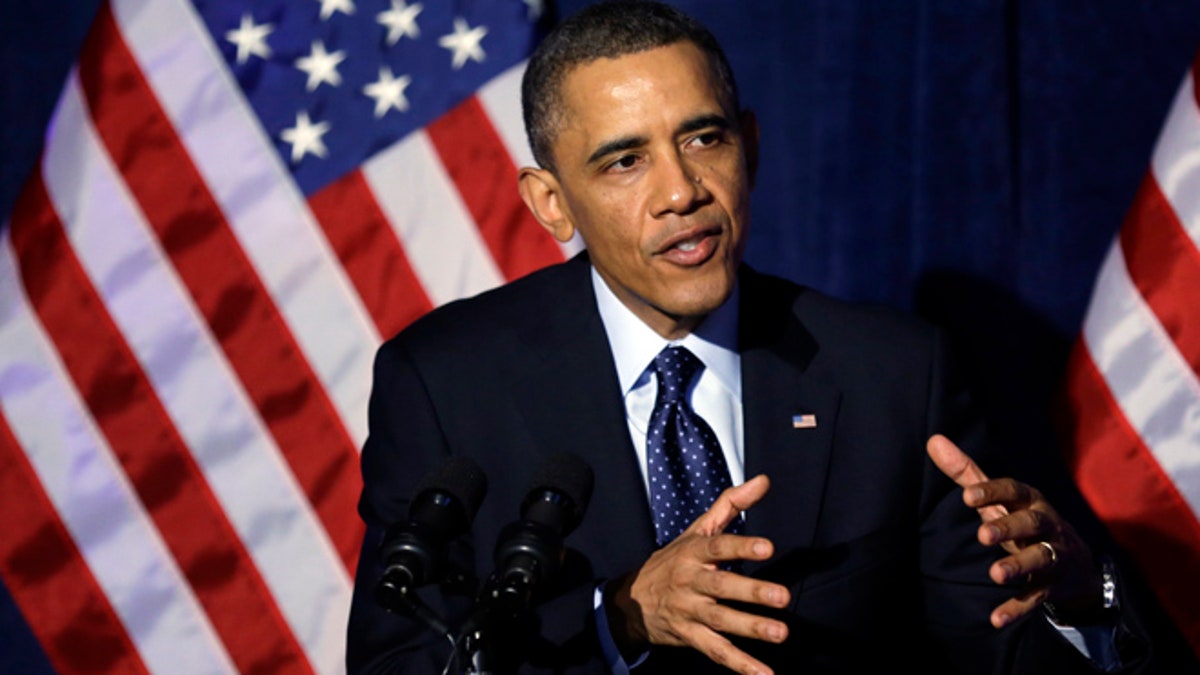
FILE: March 13, 2013: President Barack Obama speaks at the Organizing for Action dinner in Washington. (AP)
President Obama has granted a record-low number of pardons, putting a spotlight on how and why presidents from both political parties are less inclined to use the veto-proof privilege and sparking calls for change.
Obama earlier this month issued pardons for 17 people to bring his total to 39 -- the fewest for a U.S. president in roughly the past 100 years.
However, Obama’s number is not an outlier. It is, in fact, part of the larger trend in which presidents have been granting fewer pardons.
Not since President McKinley, who granted 291 pardons, albeit over only two years, has a president granted so few.
For example, President Truman was among those granting the most, with 1,913 from 1945 to 1953.
However, the numbers drastically fall off in the more modern era – 863 petitions granted by President Nixon, 393 for President Reagan, 396 for President Clinton, 74 for President George H.W. Bush and 189 for President George W. Bush.
Experts focus on a couple of key factors to explain the trend: the Justice Department managing the process and presidents concerned about the potential political backlash.
“That is a shame, for the pardon power properly understood, is one of the greatest bulwarks of individual liberty” said Paul Rosenzweig, a legal scholar at the conservative think tank the Heritage Foundation. “It is in effect the personification of the government acting as a check on the institutions of the government.
"Leaders today would do well to remember the value of the pardon power and restore it to the former prominence.”
Requests for a pardon or to have a sentence communicated for a federal offense are sent to the Justice Department’s Office of the Pardon Attorney. And the recommendations are sent along to the president for his signature.
Rosenzweig sees two major problems under the system.
Agency reviewers might see a request for clemency as a challenge to the administration’s law enforcement policy and career prosecutors are part of the review progress, which means they might be unwilling to make a recommendation, considering their primarily work is to punish criminals, he told FoxNews.com.
“Career prosecutors, like any human beings, are products of their culture and less likely to see flaws in the actions of their colleagues,” he said.
Still, he acknowledges the impracticality of a busy president taking on the entire process himself.
Rosenzweig, like the Center for the Study of the Presidency and Congress's Dan Mahaffee and others, also points out the perilous history of presidential pardons. Clinton, they remind, on his last day of office pardoned Marc Rich. He was the husband of wealthy donor Denise Rich and moved to Switzerland ahead of being indicted on federal tax-evasion charges.
Mahaffee, the group’s policy director, also points to President Ford pardoning Nixon.
“That was a lightening rod,” he said. “It was likely the right thing to do in terms of the nation healing quickly. But it hurt his presidency.”
As conceived by the country's founders, the pardon played a big role in public policy, with Alexander Hamilton arguing a "well timed" pardon offer could even quiet a rebellion.
Margaret Love, a lawyer who served as the U.S. pardon attorney in the Bush and Clinton administrations, said Saturday the Justice Department has become “unremittingly hostile” to the pardon process and urged Obama and future presidents to consider more pardons.
“It’s a shame,” said Love, who now submits clemency petitions. “A president has a constitutional duty to be merciful."
The White House declined to comment for this story.
Of Obama’s most recent pardons, the offenses included falsely altering a money order, unauthorized acquisition of food stamps, drug violations and possession of an unregistered firearm.
Some of the crimes drew light penalties in the first place — such as a North Carolina woman sentenced to two years' probation and 100 hours of community service for distributing satellite cable decryption devices.
A dozen of the 17 had been placed on probation. The other five had been sentenced to prison terms ranging from 54 days to five years. For those placed on probation, the length ranged from one year to five years.
The Associated Press contributed to this story.




